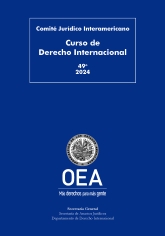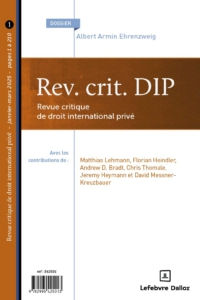Last summer, Andrew Dickinson (Professor of the Conflict of Laws, University of Oxford, and former editor of ConflictofLaws.net) delivered a special course at the summer course of the Hague Academy of International Law entitled ‘Natural Justice in Recognition and Enforcement of Foreign Judgments’. It has now been published as Volume 446 of the Recueil des cours / Collected Courses.
The blurb reads as follows:
This special course assesses the utility of ideas of ‘natural law’ and ‘natural justice’ as tools to explain, rationalise and develop the rules governing the recognition and enforcement of foreign judgments currently applied by the world’s legal orders.
After introducing the topic, the first part of the course consider how influential 17th and 18th century accounts of the law of nature sought to account for the relations existing between all human beings, as well as the creation of political societies with law-making powers, the global ordering of those societies and the role of adjudication as a means of resolving disputes within and among them. This provides the historical and intellectual background for what follows.
The principal part of the course considers how writers on the conflict of laws in this period drew upon and utilised these ideas, as the rules that we apply today to regulate foreign judgments began to take shape. This leads to a study of the further evolution of the legal landscape in the 19th century, highlighting the use of natural law reasoning by judges and commentators to explain and justify the effectiveness of individual exercises of adjudicatory authority beyond their original domains, as well as the later rejection of natural law thinking in favour of models centred on ideas of sovereignty and territoriality, which continue to dominate today.
Having completed this historical survey, the course examines the specific legacy of natural law reasoning in the common law world, involving the use of principles of ‘natural justice’ to deny recognition of unjust foreign judgments, as well as the counterparts of these principles in other legal systems and international treaties.
Drawing on the preceding material, the concluding chapter considers the case for renaturalising the law in this area, and the implications of following this path.
More information on the book can be found here.
It is available to subscribers to the Recueil des cours here.


 Written by Hadrien Pauchard (assistant researcher and doctoral student at Sciences Po Law School)
Written by Hadrien Pauchard (assistant researcher and doctoral student at Sciences Po Law School)
